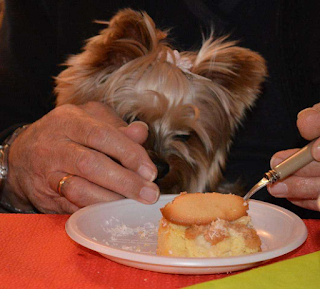Does your dog paw, bark or stare at you with melting eyes every time you try to eat?
Stopping begging
Preventing the expectation of food from human plates is the best strategy.
■ Make a strict house rule that dogs never eat from plates.
This stops them learning that plates are accessible to them.
■ Avoid leaving food within reach.
Even if you have a tall or agile dog, you must never let them achieve ‘the jackpot’ of food on the table.
Once learned, never forgotten.
■ Scrape leftovers into the bin, and never let your dog polish them off.
It’s very easy to get a fat dog when they are constantly given extras.
■ Get your dog into the habit that food only comes from their own bowl or a human hand when
being trained formally. The food doesn’t come from the human plate at all.
■ If you want to give your dog some leftover meat, scrape it into a dog bowl first.
Tidy away your own plates and cutlery, and only give them the meat
when it’s a mealtime (or training session).
Barking and pawing
It may be that your dog has already achieved the goal of getting you to share food, or maybe a relative or family
member has done this. Or it may be that your dog is simply a bit of a foodie! Ignoring unwanted
behaviour can work in the short term, but more often it escalates the pestering until it is unbearable and you finally
give in.
Mealtimes are bedtime!
and longer periods.
■ Have your dog’s own bowl visible, containing some of his tastiest food.
■ Next, ask your dog to go to his bed (I usually say ‘Bed’ or ‘Mat’ for this), luring him with a piece
of the tasty food.
■ As he arrives on the bed, praise him and give him the food.
■ Repeat as you gradually move further and further away from the bed.
Your dog should run to his bed after a few tries, waiting for you to bring the
food reward.
■ Repeat while you are sitting at your dinner table (or on the sofa, or wherever you usually
eat). Carry on asking your dog to go to his bed, and either take him the food or throw it to
him, depending on your aim!
■ Finally, build up to occasionally taking a piece of food from his own bowl and tossing it across
to his bed while you eat your own meal. Ensure that you aren’t seen to take food from
your own plate!
The ‘lazy way’ An easier, less time-consuming way is to get your dog’s own food ready at the time you
are about to have your own meal, but this time put it into a container that your dog has to forage to get to.
Use a longer lasting food toy, such as a hollow Kong, that you can pack your dog’s food inside. Freeze it
if necessary to make it last! When it’s your mealtime, place your dog’s food toy on his bed and let him
enjoy it while you eat in peace.
He has to keep it on his bed and isn’t allowed to drop it and come over to you.
You might want to use a crate or stairgate to keep him there in the early stages.


No comments